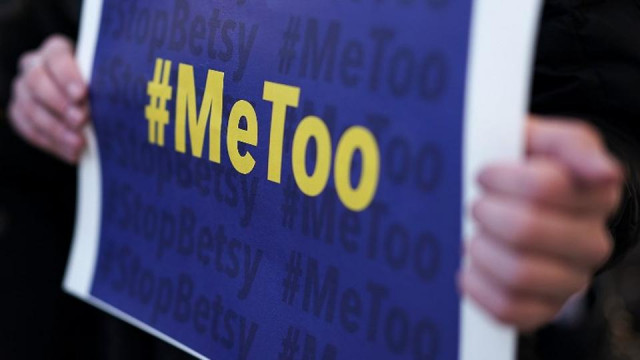Understanding the trauma behind #MeToo
Trauma responses such as friend, flop and freeze are frequently mistaken as consent

#MeToo. PHOTO AFP
For Pakistan, the #MeToo moment dates back to 2002 when Mukhtaran Mai stood tall against the ‘honour revenge’ tradition and took her rapists to the court.
The #MeToo movement too was founded in 2006 by Tarana Burke but it was not until last year when a mass movement united survivors across the globe. The feat was achieved by the hashtag #MeToo.
It has provoked debates about what constitutes harassment or assault. While some plead ‘defamation’, others deliberate over the timings of accusations. The legitimacy of circumstances leading to the claim is questioned as the immediate response of the victim comes under a microscope.
In some cases, such as footballer Ronaldo, the defence asserts it was consensual. In another, comedian Aziz Ansari said he ‘misread’ the situation.
The explanations seem convenient but are accepted nevertheless. Typically because of the lack of evidence to corroborate the accusation — how does one prove to have been harassed if there were no witnesses or a spy-cam? How does one prove rape years after the victim finds courage to speak up?
The truth is: you cannot. Hence, most predators walk free.
It is hard to dispute evidence but the confusion to believe when an individual says it was non-consensual and classifying the incident as harassment or assault can be explained through science.
A human brain is both rational and instinctive. The body is innately wired to respond intuitively when exposed to trauma. The mind gives precedence to survival over all. When a threat is identified, the hypothalamus immediately stimulates to respond by triggering of stress hormones to prepare the body to defend itself (Cozolino, 2002).
Researchers have identified five automatic responses to a threat — these reactions help mental health practitioners understand how people respond to abuse.
The most common among these is Fight or Flight. When threatened, one may illustrate subtle or overtly aggressive behaviour, this reaction is called fight. Flight means the person focuses on moving away from the threat. The lesser known Fs include Freeze, Flop and Friend.
Friend is the earliest defensive strategy — an infant’s cry seeking attention of a caregiver. Throughout life when fearful most humans will activate their social engagement system (Porges, 1995). It is most evident in the child who smiles or laughs when being chastised. Smiling when fearful is an unconscious attempt to socially engage the person causing fear.
On the other hand, freeze provides a natural analgesic against the threat (Levine, 1997). It indicates submission. For the victim, however, it is the realisation that immobility may prevent further damage and allows the best chance to survive.
Flop refers to a state of total submission. The brain goes offline as the body yields in to the threat. Here the individual will submit in an attempt to stay alive.
A person’s response to sexual misconduct or assault is largely based on their survival strategies. An individual’s subjective experiences dictate the pairing of fear responses to certain threat (Levine, 1997).
In a sexual misconduct or harassment situation, friend, flop and freeze are frequently mistaken as consent. The responses can be deceiving to both, the victim and the accused. Where the accused may fail to pick up non-verbal cues, the victim may doubt their own sense of behaviour.
The trauma can also lead to psychogenic amnesia; described by Freud as an act of self-preservation where unpleasant memories are repressed or blocked from entering the conscious mind. This is one of the reasons behind delayed accusations.
As #MeToo picks up in Pakistan, we need to be prepared to understand and explore all dimensions of a scenario before questioning the victim(s).
Published in The Express Tribune, October 22nd, 2018.
Like Opinion & Editorial on Facebook, follow @ETOpEd on Twitter to receive all updates on all our daily pieces.














COMMENTS
Comments are moderated and generally will be posted if they are on-topic and not abusive.
For more information, please see our Comments FAQ